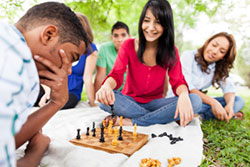Back to the February Issue
Capturing Your Creativity:
How to Engage Your Brain Outside the Classroom
By Anna Lekas Miller
If you’re anything like me, college is really, for lack of a better word, hard. The workload is intense, and though I was always smart, I never considered myself a “student.” So hundreds of pages to read per week on top of essays and exams sometimes feels more overwhelming than intellectually stimulating. I always study (and enjoy many of my classes), but I was never the type to pull all-nighters often or write papers at the last minute.
Meanwhile, my friends seem to live in the library. They are constantly stressed and sleep-deprived, and frequently cancel social plans to increase their study time. While this may work sometimes, it can also lead to exhaustion and burnout, hindering their creativity and problem-solving abilities.
I crave the in-between space. I’m eager to do things outside the classroom (and the library), but I always thought that they would interfere with my ability to complete my schoolwork. Guess what? Science shows that this isn’t the case.
For more about how inspiration works, CLICK HERE.
Colin shares his ideas on how to engage your brain. (MP4, 01:15)
Use Your Brain in Different Ways
According to research done by Rachel Hollrah at Iowa State University in Ames, participating in extracurricular activities has many benefits. To begin with, students who are engaged in things outside the classroom are better at time-management. The theory is that students who juggle activities and academics are forced to optimize their study time.Students also develop a better sense of discipline and focus through exercising their brains and their bodies in a variety of ways, which then improves their academic performance. Plus, many students who are at-risk for dropping or failing out of school ultimately find the support network they need through extracurricular activities.
Maureen D., a senior at New York University in Manhattan, says, “One of my favorite hobbies is to hang out with French speakers. This makes my French grades much better and improves my language abilities, and I really enjoy it at the same time!”
According to Mary Rombokas, an education expert consulted in Hollrah’s research, this is a common cause-and-effect equation. Even in instances that aren’t as obvious as practicing a foreign language, participation in “fun” activities has been shown to be beneficial to students’ current studies, and also impacts future accomplishments. Rombokas studied students participating in high school extracurriculars and found they had overall better grades once they got to college than those that weren’t involved outside the classroom.
Amanda talks about her creative outlets. (MP4, 02:15)
Using your brain in alternate ways can actually open up pathways for problem solving. Kaitlyn P., a pre-nursing student at De Anza College in Cupertino, California, suggests games like Sudoku and crosswords. She says, “You can do these in small chunks of spare time. They even make books of puzzles to carry in a bag.”
When you’re thinking about the details in something you enjoy, your brain isn’t dormant in all its other areas. You might find that right in the middle of a conversation with your ballroom dance partner, or while strategizing about how to play a great Scrabble™ word, inspiration hits. You’ll be able to return to your studies with renewed energy and some creative ideas.
To see how Hampshire College, in Amherst, Massachusetts, fosters creativity and learning, CLICK HERE.

Find Inspiration in Play
So, if you’ve been craving a little bit of time away from the books, try doing something more stimulating than watching Netflix. To get started, ask yourself a few questions:- How much time am I willing to commit? Can I do something on a schedule, or should I stick with something more flexible?
- Do I want to take a leadership role in a collaborative activity? Or do I want to do something that I enjoy on my own?
- What fun activity might turn my studies into a more hands-on experience?
The actual activity is less important than the fact that it takes your mind off school for a few hours and lets you refocus your brain on something different, engaging, and fun. You can return to a hobby you’ve had for a long time (perhaps you collected stamps with your grandfather) or try something you never pictured yourself doing (the campus improv comedy troupe needs a few more members). Stay open-minded and give some things a try.
You don’t need to start up an activity that requires extensive commitment—though that works if you’re up for it. The challenge of learning a new sport, how to play chess, trying your hand at sculpting, or investigating your family tree are all things that will stimulate your brain in new ways.
Christian explains how he likes to stays creative. (MP4, 02:53)
Get into the Groove
Madonna may not be a member, but school clubs are a great place to start: many of them have budgets to subsidize the cost of activities that might otherwise be expensive. In addition to learning and participating in things you enjoy, student organizations and outings are a great way to meet new friends that share a common interest. Membership and leadership positions are also important for rounding out your résumé.What about taking a class? No, not that kind of class—a fun one! Schools often offer two-credit courses in things like studio art and photography, dance classes for non-majors, and creative writing workshops. Kate B., a sophomore at Winona State University in Minnesota, says, “I highly recommend these ‘fun’ classes! It was nice to not worry about extensive homework and big tests, and I learned something new.”
If you haven’t found exactly what you’re looking for, you can speak with professors and other advisors to see if they’d like to work one-on-one or help you form a new club.

Also try community organizations. If you are in or near a city, there will be plenty of resources, like the local YMCA, MeetUp Groups, and non-profits that are looking for volunteers. If you’re in a smaller town, plenty of community centers offer classes and clubs that might strike your fancy and broaden your horizons.
Once you have found an activity—something that you like—it’s important to stick with it. If you feel stressed about school and like you need to focus solely on academics, remember that unless you are really behind, one extra hour or two of studying isn’t going to make that big of a difference.
In the long run, getting involved with hobbies and other creative activities ultimately enhances your brainpower and, as a result, supports your academic success. Plus—that trip you take with your ski club, play you put on with your drama class, or insight you gain through reading to kids—will stick with you long after your grade point average no longer matters. You’ll make friends, and might even unlock the door to a life-long passion.
Take Action!
- Consider building upon something you like to do and are good at.
- What would you like to learn more about? What have you never done before? Ask friends what they enjoy, and if you’re up for it, venture outside your comfort zone.
- Find somewhere to do your chosen activity. Start with school, but don’t limit yourself. Look at what is available at other schools or in the community, too.
- Decide how much time you want to devote to your creative pursuits, and stick with it!
ANNA LEKAS MILLER is a journalist and social justice activist. She is a 2012 graduate of New York University.

